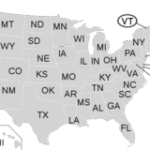In the United States we have a representative democracy which allows the people to have a large say in how the government is run. To ensure this we have political parties that compete in elections for the majority votes to gain political offices and control policy. In order to gain influence over these government policies, these parties campaign either formally or informally in order to gain these votes. As based upon the history, goals and tactics of vis-à-vis elections and campaigns, the existence of a two-party political system instead of a multiple party or uni-party system has both its advantages and disadvantages. We can see both these advantages and disadvantages present in the other two political fraction systems and how the two-party system can be seen as the median between the two.
Uni-party systems have one major political power. These systems are useful in that they have no opposition. Ideally when this is the case and there is only one opinion on government matters, decisions are reached more rapidly which allows more time for growth or development of that country. However, history has shown that most countries that have this system either are, or have turned into, military dictatorships. Due to this alone a uni-party system does not support vis-à-vis elections or campaigning since it requires two parties in order to offset one another and keep the other in check. In does not allow it to be a democracy either when it becomes a dictatorship by definition.
Multiple party systems is one in which numerous political parties are allowed to vie for control. They are useful in the fact that smaller parties are present in legislation and government. Also, because there is a larger range of groups present, there is also a larger range of interests and ideals to choose from so that people are more likely to find a group that they feel represents them to the fullest capacity. However, as more parties are present then there is less efficiency since so many people are working towards different goals. This also lowers feelings of accountability and responsibility from the high amount of dissent. Campaign costs as well rise since there is a need to represent more information and issues in them in order to debate against so many other groups, So coalitions are formed to pull support, resources and money but these will not always stay together after the elections due to difference in political views.
A two-party system is when two parties dominate in most areas, particularly with voting, and it seems a mixture of the other two systems in both their advantages and disadvantages. Unlike a multiple party system since there are only two primary groups and they compete mostly against each other for votes, a lot of their stances remain similar in an attempt to gain votes from the “middle man,” there is more stability as this keeps them from going to extremes and keeps the government from changing rapidly. However in order to separate themselves from the other party they do hold different stances which helps to promote growth and change like in a uni-party system only with the choice of options as well so that the people have some type of say. However, because there is not one party you have to pick, or multiple parties that you can chose from, it is harder to pick a moderate candidate which can lead to great policy changes in which people feel they had little say even though they are being told that they did. When this sometimes occurs it can lead to a lot of citizens not casting their votes which can give control to a party based on only a small population’s opinion. It resembles a uni-party system in this case because at times the parties seem not to be too separate from one another enough to make a difference in who is being voted for. Predominately though, the two party system works best with the electoral system, constitutional agreements and voting system, in that it supports democracy and stability. We have to remember that rarely is anything perfect and because of such it is often better to choose somewhere in the middle of extremes so that when we need to move closer to one direction or the other we are equidistant from both which reduces stress and strain for the political atmosphere and the people.

